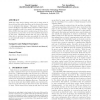Free Online Productivity Tools
i2Speak
i2Symbol
i2OCR
iTex2Img
iWeb2Print
iWeb2Shot
i2Type
iPdf2Split
iPdf2Merge
i2Bopomofo
i2Arabic
i2Style
i2Image
i2PDF
iLatex2Rtf
Sci2ools
122
Voted
GECCO
2008
Springer
2008
Springer
Collective intelligence and bush fire spotting
Bush fires cause major damage each year in many areas of the world and the earlier that they can be detected the easier it is to minimize this damage. This paper describes a collective intelligence algorithm that performs localized rather than centralized control of a number of unmanned aerial vehicles (UAV) that can survey complex areas for fires, devoting attention in proportion to the user specified importance of each area. Simulation shows that not only is the algorithm able to perform this action successfully, it is also able to automatically adapt to a simulated malfunction in one of the UAVs. Categories and Subject Descriptors I.2.8 [Problem Solving, Control Methods and Search]: collective intelligence General Terms Algorithms, Experimentation Keywords Algorithms, scheduling, collective intelligence, collaborative search, unmanned autonomous vehicles
Collective Intelligence | Collective Intelligence Algorithm | GECCO 2008 | Optimization | Unmanned Aerial Vehicles |
| Added | 09 Nov 2010 |
| Updated | 09 Nov 2010 |
| Type | Conference |
| Year | 2008 |
| Where | GECCO |
| Authors | David Howden, Tim Hendtlass |
Comments (0)

